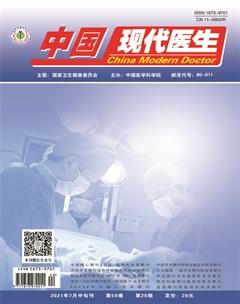卵巢恶性肿瘤保留生育功能手术后化疗的应用效果及有效率分析
嵇海舟 任密
[摘要] 目的 探討卵巢恶性肿瘤患者行保留生育功能手术后化疗的应用效果。 方法 回顾性收集我院妇科2015年2月至2016年10月收治的卵巢恶性肿瘤患者80例的临床资料,根据治疗方法分组:对照组行单纯保留生育功能手术治疗,试验组行保留生育功能手术和术后化疗,观察两组患者的治疗有效率、随访12个月的肿瘤复发率和远处转移率、随访3年的自然妊娠率、成功分娩率,并对比两组停经患者的性激素(E2、LH、FSH)水平。 结果 试验组的治疗有效率为92.5%,高于对照组的75.0%(P<0.05);试验组随访12个月的肿瘤复发率和远处转移率均低于对照组(P<0.05);试验组的停经率和月经减少率均高于对照组(P<0.05);且两组的停经患者中,试验组停经持续时间长于对照组(P<0.001);两组停经患者停经期间和月经恢复后的E2、LH、FSH水平比较差异无统计学意义(P>0.05);在月经恢复后,两组患者的E2、LH、FSH水平也逐渐恢复到正常范围。随访观察3年,两组的自然妊娠率和成功分娩率比较,差异均无统计学意义(P>0.05)。 结论 卵巢恶性肿瘤患者行保留生育功能手术后化疗会对卵巢功能造成一定不良影响,但是更有利于促进肿瘤控制,预防肿瘤复发和远处转移,且不会对患者的生育功能造成明显影响。
[关键词] 卵巢恶性肿瘤;保留生育功能手术;化疗;性激素;停经;妊娠率
[中图分类号] R737.31 [文献标识码] B [文章编号] 1673-9701(2021)20-0093-04
Analysis of application effect and effective rate of chemotherapy after fertility preserving surgery for patients with ovarian malignant tumor
JI Haizhou REN Mi
Tenth Area of Department of Gynaecology,Fujian Provincial Cancer Hospital,Fuzhou 350014,China
[Abstract] Objective To explore the application effect of chemotherapy after fertility preserving surgery for patients with ovarian malignant tumor. Methods The clinical data of 80 patients with ovarian malignant tumor admitted to our Department of Gynecology from February 2015 to October 2016 were retrospectively collected and grouped according to treatment methods.The control group was treated with fertility preserving surgery alone,and the experimental group was treated with fertility preserving surgery and postoperative chemotherapy.The treatment effective rates,tumor recurrence rates and distant metastasis rates after 12-month follow-up,natural pregnancy rates after 3-year follow-up,and successful delivery rates were observed in the 2 groups.The levels of sex hormones (E2,LH,FSH) in the two groups were compared. Results The treatment effective rate of the experimental group was 92.5%,which was higher than 75.0% of the control group (P<0.05). The tumor recurrence rate and distant metastasis rate in the experimental group were lower than those in the control group after 12-month follow-up (P<0.05). The rate of menopause and loss of menstruation in the experimental group were higher than those in the control group(P<0.05). In both groups,the duration of menopause in the experimental group was longer than that in the control group (P<0.001). No significant differences were observed in E2,LH and FSH levels between the two groups during menopause and after menstrual recovery(P>0.05). After menstruation resumed,the levels of E2,LH and FSH in both groups gradually returned to the normal range. After 3-year follow-up,no significant differences were observed in the natural pregnancy rates and successful delivery rates between the two groups(P>0.05). Conclusion In patients with ovarian malignant tumor,chemotherapy after fertility preserving surgery will cause certain adverse effects on the ovarian function,but it is more conducive to promoting tumor control,and preventing tumor recurrence and distant metastasis,and will not cause significant effects on the fertility of the patients.

